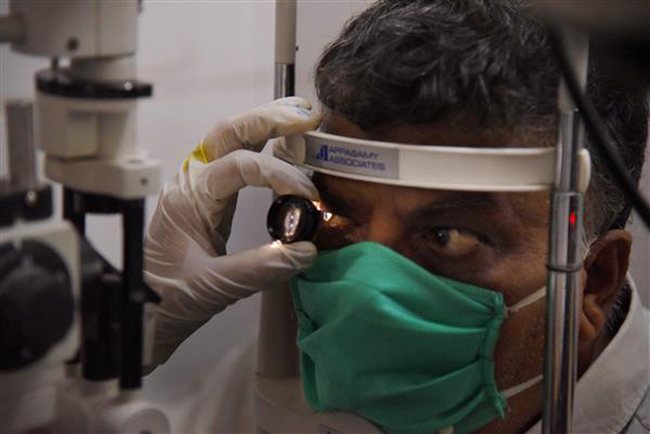Kolkata: Because of the increasing number of mucormycosis cases, commonly known as black fungus in West Bengal, doctors are already sounding alarm bells. Till June 4, the state had almost confirmed 30 cases, and the number of fatalities reported was 5, according to a health bulletin by the state government.
The rare fungal infection, which has always been there in India, has seen an exponential rise in the last couple of months. What has complicated matters for the doctors, treating these patients is that there has been a shortage of the amphotericin-B drug, which is used to treat such cases. With many of the states like Karnataka and Rajasthan already declaring it an epidemic, there are enough signs of worry for the doctors and coronavirus patients, either undergoing treatment or cured as the incubation period of the fungus is from 18-21 days of the first showing of Covid-19 symptoms.
India recorded 11,717 cases of mucormycosis till Wednesday.
Explaining the phenomenon, ENT specialist at Medica Superspecialty Hospital, Dr Shaswati Sengupta Dutta says, mucor, which causes the disease, is present in the environment. India, right now, is witnessing a spurt in rhino-cerebro-orbital mucormycosis, where the nose, nasal sinus (in some cases), orbit and brain are affected. Other forms of mucormycosis are pulmonary and gastro-intestinal and the cases are seen in immune-compromised people.
India being the diabetic capital of the world, it is more alarming as the disease has affected most people who do not have proper control of their blood sugar levels.
Aiding the spurt in black fungus cases is the rise in Covid-19 cases, which requires the administration of steroids for critical patients. Dr Shaswati Sengupta Dutta says people who have undiagnosed diabetes have become susceptible to black fungus. “Use of steroids and some other types of antibiotics along with uncontrolled diabetes have aided the spread of mucormycosis. We know that Covid-19 causes immune suppression, making patients susceptible to the fungus.
Cheek pain, pain or numbness in the tooth, nasal blockade, watering from nose and eyes, foul-smelling nasal discharge, blackening or redness of the skin can all be symptoms of black fungus and doctors feel early detection is important or else it can prove fatal.
“At Medica, we have already formulated one of our protocols regarding early detection of black fungus. For hospital patients, we are monitoring them from the very beginning of their treatment, especially for diabetic patients, who are on steroids or in ventilation for long or on oxygen therapy. We are looking out for clinical symptoms as well as doing radiological investigations. We are also asking patients, discharged from our hospital and getting home care, to come back to us for diagnostic tests for early detection,” said Dr Sengupta Dutta.
Dr Debraj Jash, a pulmonologist at Apollo Hospitals, says that mucormycosis is an “opportunistic infection” which prefers humidified atmosphere and has come in limelight during the second wave as many clusters are reporting such cases, unlike the first wave.
“We always knew that people with diabetes are prone to it. The use of steroids, sometimes indiscriminate, on Covid patients is a primary reason for the sudden spurt. Also, in the second wave, the number of affected people is much higher, resulting in the shortage of medicine. Sharing of same steam pot can also lead to such cases,” warns Dr Jash.
The doctor also blames the overuse of zinc tablets amongst people as a contributing factor. “This fungus likes zinc and these days people are popping zinc tablets indiscriminately. We are presently treating five such patients at Apollo. Medicine can cure black fungus, but in severe cases, we need to operate to save the patient,” said Dr Jash.
Dr Dhrubo Roy, a senior ENT consultant at AMRI Hospitals, says it is very important to maintain hygiene and take precautions if a positive patient is on long oxygen support or using an oxygen concentrator to treat himself at home. He gives a demonstration of how a dehumidifier should be cleaned and how the water used in it can be sterilized.
“The fungus is mostly found in polluted places, where there is less or no air circulation, stagnant water or stale food. In the case of a dehumidifier, the water can also be the medium if it is not cleaned properly or regularly. The water used should be distilled water and the equipment has to be cleaned with water mixed with betadine. One should not use industrial oxygen for therapy at home,” cautions the ENT consultant.
“The symptoms of black fungus are usually seen within 18-21 days of one showing Covid-19 symptoms. So, we can say that up to three weeks from the first manifestation of Covid-19 symptoms, a cured patient is vulnerable,” said Dr Roy.
If the black fungus was causing tension in Covid-recovered patients, the first case of while fungus was reported in New Delhi hospital on May 27.
